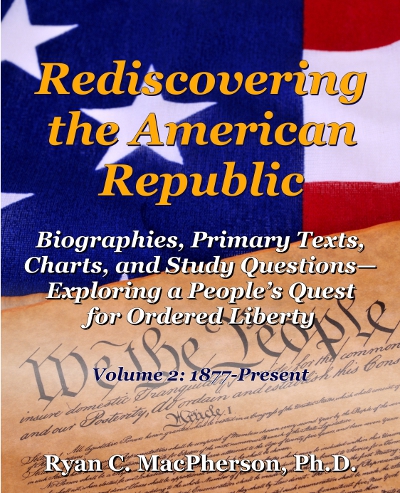Oral Testimony of Ryan C. MacPherson, Ph.D.
Minnesota Social Studies K-12 Academic Standards Hearing
Roseville, Minnesota, 20 December 2012
(transcript revised 26 December 2012)
Note: This oral testimony was provided extemporaneously from notes prepared both prior to and during the hearing. The following is an attempt to reconstruct the actual wording in response to a request by the court reporter. A more extensive and polished presentation will be submitted at a later date in the form of written testimony.
My name is Ryan C. MacPherson. I have a Ph.D. from the University of Notre Dame. I am chair of the History Department at Bethany Lutheran College in Mankato. I teach students who are majoring in both Elementary Education and also Secondary Education for Broad Field Social Studies. In addition to teaching courses in American history, I also oversee curriculum development and instruction in a variety of other fields serving the future teachers of this state. In my written testimony, to be submitted at a later date, I will provide additional evidence of my expertise, but let me now jump to the bottom line:
The proposed revisions for Minnesota’s social studies standards should be rejected because they are academically inferior to the current standards and legally unnecessary.
As a college professor, I agree with Dr. Debbi Daniels, who has stated that these revised standards will not equip students for college. Minnesota statutes require that public education prepare students for college, but these new standards will fail to fulfill that legislative mandate.
We are here today to talk about social studies, so let me offer a brief social studies lesson that will illustrate the academic inferiority of the proposed revisions.
The 2004 Standards require instruction concerning “Political Unrest and the American Revolution 1763- mid-1791.” (Standard Category I.D., at p. 5) This accords well with the consensus of historical scholarship concerning the American Revolution: following the Treaty of 1763 that concluded the French and Indian War, relations between Britain and America soured, with the Americans declaring independence in 1776, achieving international recognition of their independence with the Treaty of 1783, ratifying the Constitution in 1788, and ratifying the Bill of Rights in 1791.
The 2011 Proposal revamps this period into: “The divergence of colonial interests from those of England led to an independence movement that resulted in the American Revolution and the foundation of a new nation based on the ideals of self-government and liberty between 1754 and 1800.” (Standard 17, at p. 16; also, Revisor’s draft, p. 12, line 11) This proposed revision departs from the consensus of historical scholarship. It misleadingly speaks of a “divergence of colonial interests from those of England” commencing in 1754, when in fact England and the English colonies in America were allied from 1754 through 1763 against the French in the aforementioned war. At the conclusion of that war (1763), patriotism in the English colonies toward England was at its zenith. “Interests” did not “diverge” until afterward, as Parliament commenced taxing the colonists without their consent (for example, the Stamp Act of 1765) in order to pay off the war debt. Nevertheless, even this “divergence of interests” (marked in the following years by the Boston Massacre and so forth) did not constitute an “independence movement” as the revised standard would have it. As late as 1775, colonial leaders still generally viewed themselves as loyal citizens under the British constitution who were asserting their rights as free Englishmen by redressing their grievances with the Crown and Parliament. Not until Thomas Paine published Common Sense in January 1776 did Americans seriously entertain the notion of emancipating themselves from the King.
In summary, the current standard covering the American Revolution concisely summarizes that historic episode, whereas the proposed revision introduces error and confusion. To provide one more example, the current standards speak of Western Civilization, including such developments as the Renaissance and Reformation. The proposed revision deletes all references to “Western Civilization” and relegates the Renaissance to a mere example among the various “Hemispheric networks [that] intensified as a result of innovations in agriculture, trade across longer distances, the solidification of belief systems and the development of new multi-ethnic empires while disease and climate change caused sharp, periodic fluctuations in global population between 600 and 1450 CE.” (Standard 9.4.3, in 2011 Proposal, p. 124; also, revisor’s draft, p. 8, line 4) Really? Now granted, I teach American history and not European history, but I thought the Renaissance had something to do with Leonardo da Vinci and Michelangelo. How odd that neither of those fellows is ever mentioned in the proposed revision. Both of their names appeared in the examples to the 2004 standards. And let me be clear: neither one of them can even fit under this showy rubric of “hemispheric networks [that] intensified as a result of innovations ... between 600 and 1450 CE.” That’s because neither Leonardo nor Michelangelo was alive back then. They were born later—25 years later in the case of Michelangelo. I submit that the reason their names do not appear in the new proposal is because the broad outline of history has been so drastically modified as to render their inclusion next to impossible.
Suffice it to say, the proposed revisions are academically inferior to the current standards. The Minnesota Department of Education has claimed in its SONAR document to have followed the pattern of several states that it identifies as “exemplary.” But the standards of those “exemplary” states in fact include Western Civilization as a key organizing principle and assign specific standards to the Renaissance and Reformation.
I also concur with Mrs. Quist, who emphasized the distinction between natural rights and so-called individual rights. Natural rights are part of human nature, whereas individual rights can be created or destroyed by government. One person who understood this well was John F. Kennedy. I quote from his inaugural address, where he asserted that “the rights of man come not from the generosity of the state, but from the hand of God.” Kennedy understood natural rights just as surely as Jefferson and Lincoln. The current standards teach this; the new revisions do not.
Moreover, I maintain that the Department of Education has failed to meet the required burden of proof to demonstrate that the proposed changes are either necessary or appropriate from a legal standpoint. The SONAR document insinuates that Minnesota will lose federal funding unless these new standards are adopted, but the Department has failed to show that the current standards fall short of federal and state requirements (other than the relatively simple matter of changing grade bands into grade-level benchmarks) or that these particular revision proposals are the most prudent means of complying with federal or state requirements.
I echo Cindy Pugh’s concern about the removal of key persons and events from the standards. Do you really mean to tell me that the federal government will cut our funding unless we strip away Lincoln and MLK from our current standards? Of course not.
Therefore, even if there is some kind of legal or academic deficiency with the 2004 standards, and even if the present proposal somehow improves upon those deficiencies, the proposal introduces new problems all its own. The proposed revisions should not, therefore, be adopted unless and until these glaring errors are corrected. My written testimony will suggest specific amendments to that end.
Links:


